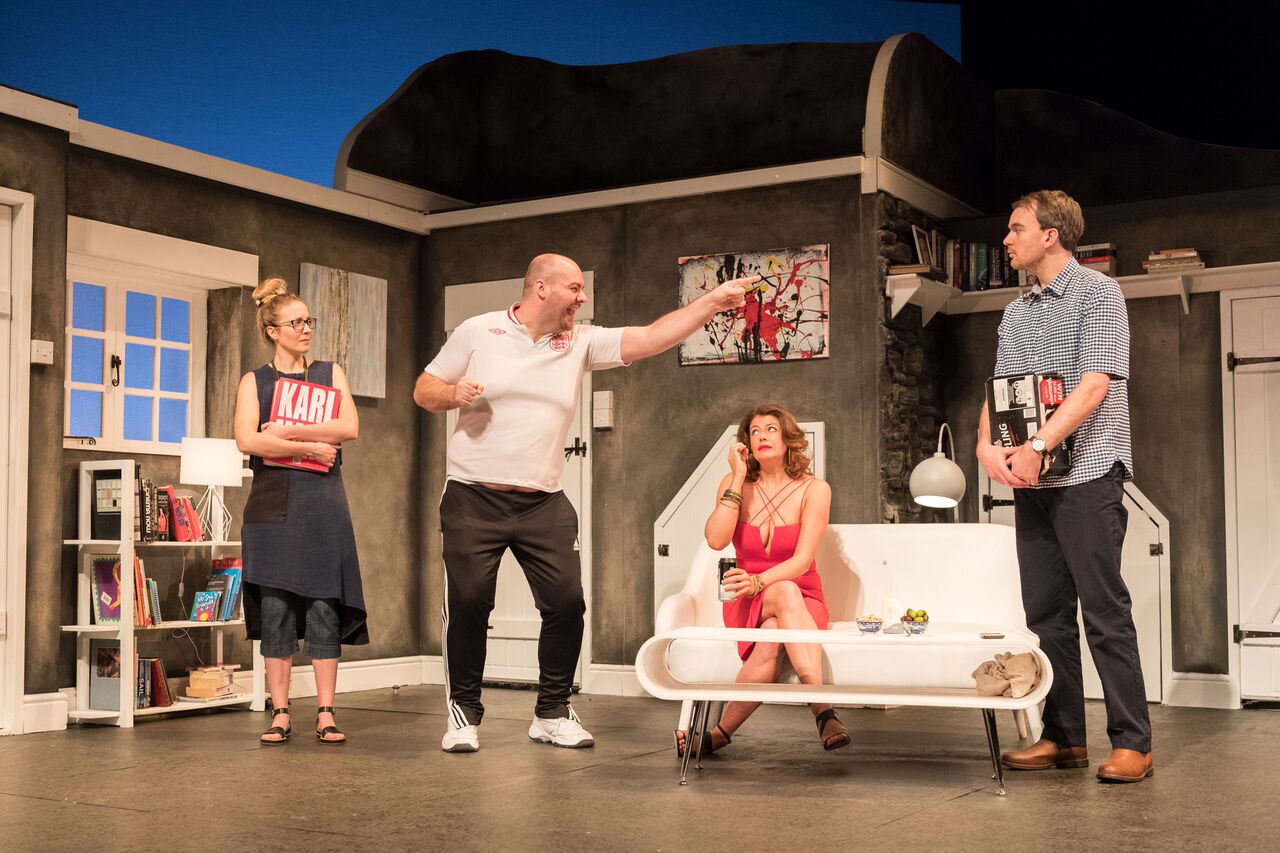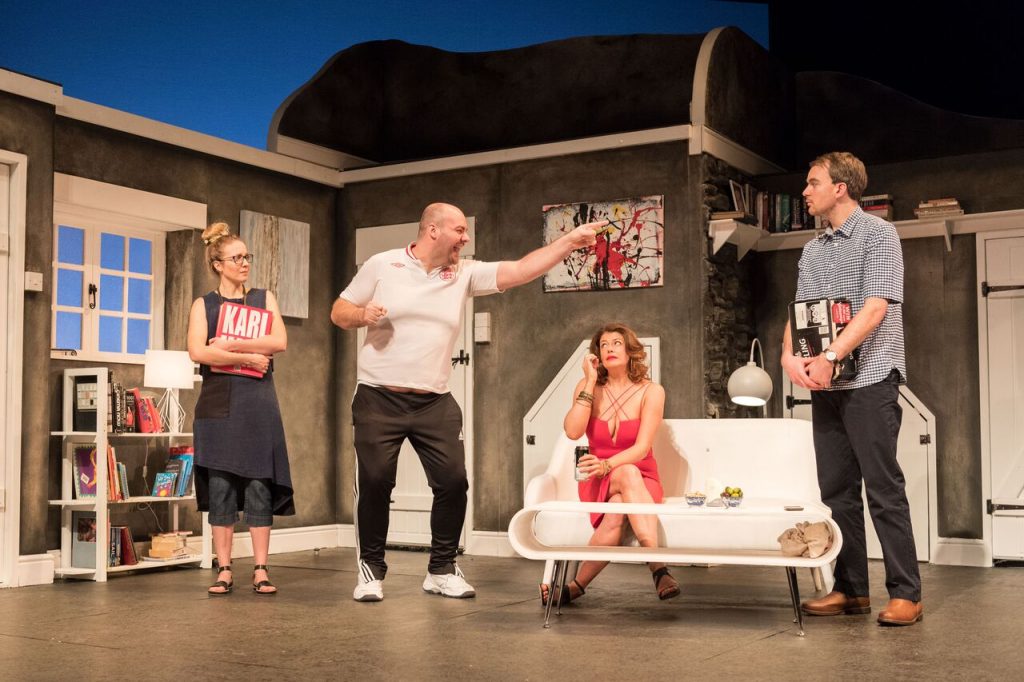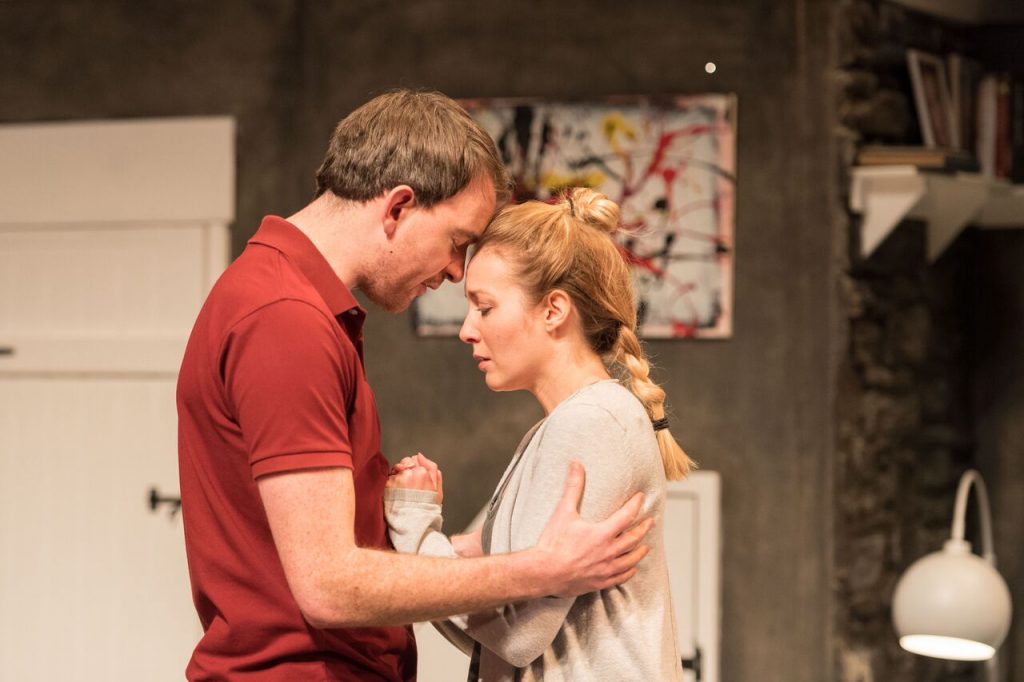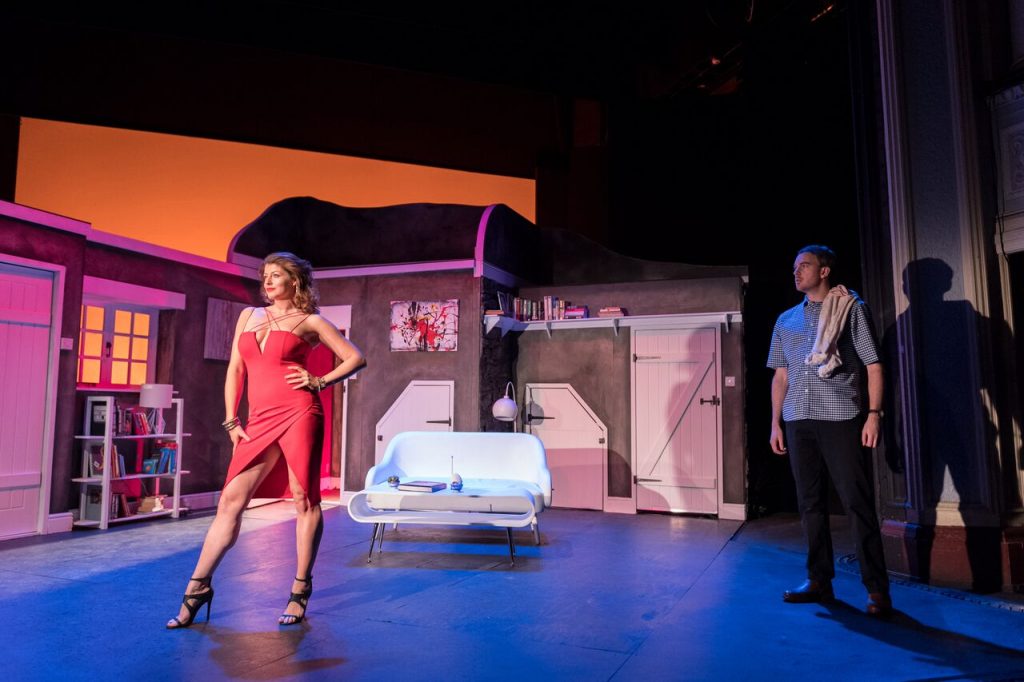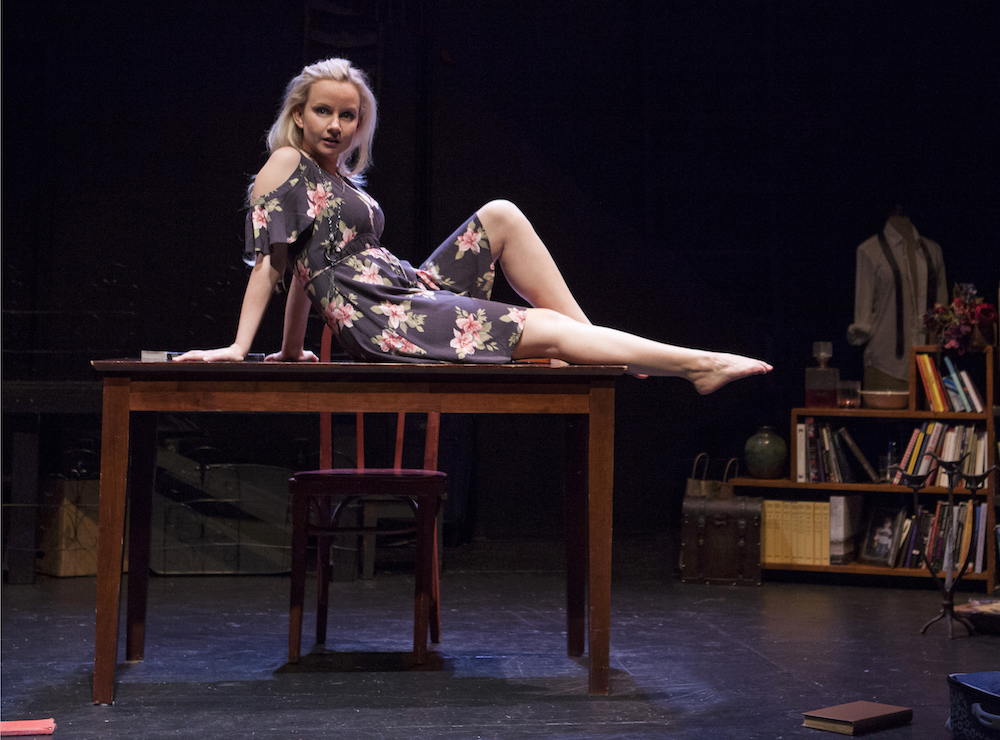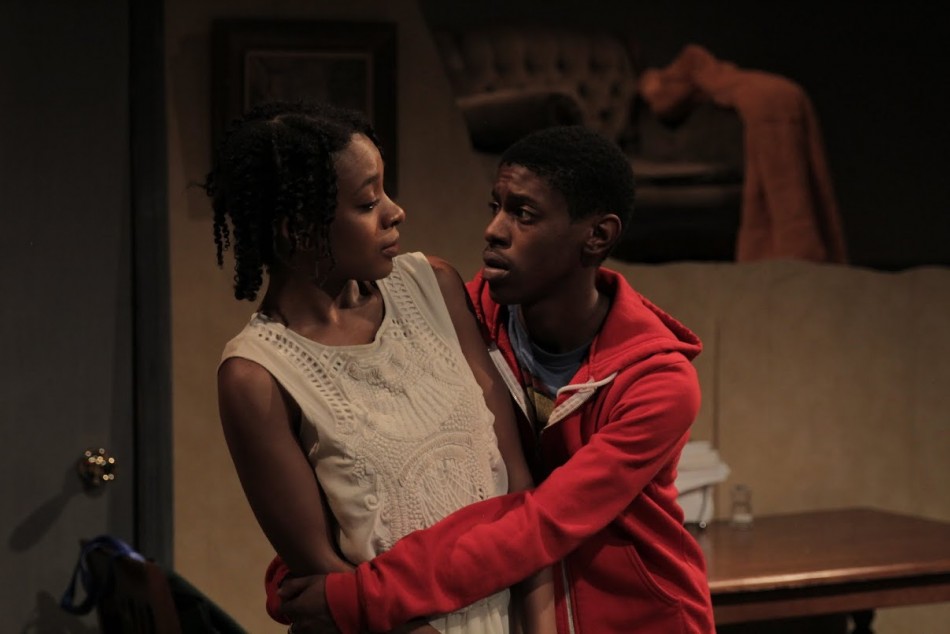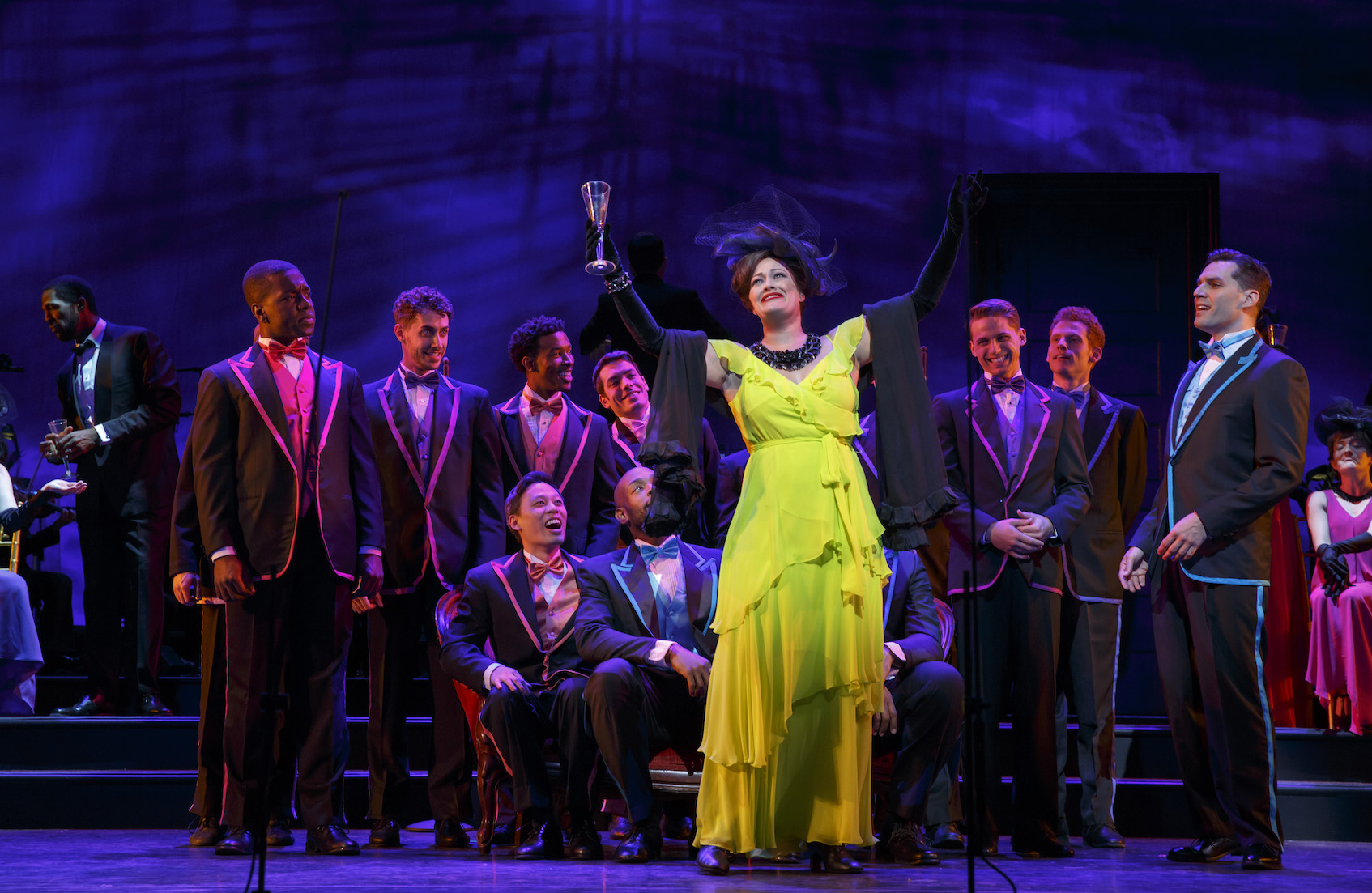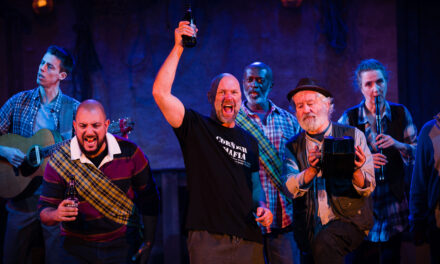by Lisa Reitman-Dobi
Torben Betts’s devastating comedy is a glorious reminder that sharp theater is alive and kicking. Directed by Stephen Darcy, Invincible will make you laugh, break your heart and leave you gobsmacked.
Wickedly au courant, Invincible takes aim at a score of age-old, high-stakes, perennial issues: class, money, ideology, identity, faith and the state of England’s national football team. Act I kicks off in medias res: a young couple is engaged in a rapid-fire verbal scrimmage, amusingly didactic and entirely riveting. Without missing an emphatic retort, they scurry about, plucking baby toys from the floor. Guests are on their way.
Erudite urbanites Emily and Oliver (Emily Bowker and Alastair Whatley) have relocated from London to this small town in the North of England. At a pace, lifetime residents Dawn and Alan (Elizabeth Boag and Graeme Brookes), arrive: “Born and bred on this street,” muses Dawn. Alan, of course, doesn’t arrive with Dawn. “He’s watching the football. England are playing . . . He’ll be over when it’s over.”
Game on. Four characters, each one a masterpiece of individuation, authenticity and desire, encounter their toughest–and most familiar—adversaries.
Emily Bowker’s Emily is ardent, compelling and at turns achingly sympathetic and vexingly myopic. Bowker’s spot-on choices in tenor, tone body language and hilarious facial expressions take Emily from personality to person. She captures Emily’s frenetic righteousness while delicately titrating the young woman’s desperate attempt to conceal deep vulnerability. Bowker’s Emily is sharp, funny and quite simply, the most engaging basket case I’ve seen. Bowker does a smashing job. Unfortunately, her character lapses into superfluity, a needless hiccup in the design of an otherwise fascinating character.
Oliver (Alastair Whately) is Emily’s partner. That’s partner, mind you, not to be confused with husband. Marriage? “Em doesn’t really believe in it.” Oliver is marvelously recognizable, a perfect specimen of old school tutelage and prep school decorum. Whately has a witty physicality that I found highly reminiscent of John Cleese: boyish, bookish, nimbly tripping over himself, a very “Python” gelasticity. His Oliver is eloquent even as he scrabbles for words, and wordlessly expressive despite his punctilious restraint (or when he’s been told to hush). Whately expertly delivers Oliver’s sundry blend of studied self-possession and ravenous wants. His Oliver displayed grace under fire, even when under the influence and on the floor.
Dawn and Alan are two of the most flesh and blood characters I’ve ever encountered. Dawn (Elizabeth Boag) is at once unassuming, candid and commanding. When Boag takes the stage, the stage is hers. A follow spot helps drive this home. Yes, she’s sexy, as her loquacious husband, Alan (Graeme Brookes), points out more than once: “She is absolutely gorgeous, in’t she, don’t you think, this woman here is one hundred and ten per cent absolutely bloody, bleedin’ gorgeous?”
Yes, where Dawn grew up, being an eyeful won high marks. But one sees, quickly, that Dawn is far more than a looker. In fact, she’s looking for a great deal more than she’s found in her circumscribed world. Dawn might be provincial by location but she is valedictory in depth and curiosity. She has a reach that exceeds her grasp, and a grasp of actualities that exceeds her lexicon. Boag’s Dawn is comedic, gentle, tough and soulful. Sublime, superb and unforgettable, Boag brings to life a character you will recall as you recall the smile of old friend.
It’s a challenge to convey the vigor, enthusiasm and inspired comedy of Graeme Brookes. His Alan is a showstopper: wildly funny and achingly insecure. Brookes is an uproarious comedian; his Alan is a jovial, gentle giant whose insouciance belies profound sensitivity. This is a play percolating with wit, and with Alan on stage, wit becomes rollicking. In an effort to engage his hosts on their home turf, Alan picks up the enormous, bright red Karl Marx coffee table book and proclaims:
I do like some of them old-style comedians like Harold Lloyd and Buster Keaton and the Chaplin when he gets all stuck in that machinery, but the Marx Brothers I just don’t get. I just don’t get the jokes to be fair, and it’s too fast for me, too clever-clever and, as I say, they don’t even begin to get anywhere near me absolute all-time one hundred and fifty per cent favorites, who are, wait for it, wait for it: Mr. Stanley Laurel and Mr. Oliver Norvell Hardy.
The glorious look of horror on Emily’s face is as precious as Alan’s fabulously awful impressions of Laurel and Hardy.
As they say when we watch the footie, “Man on!”
Invincible takes you quite beyond a hamlet in the north of England. When ivory towers share walls with row houses, pedagogy doesn’t quite sweep the steps, cat meets dogma and next thing you know, a good cricket arm leads to murder.
With storylines driven by cracking dialogue and winsome quirkiness, Invincible has a tender urgency borne of something deeply human.
Do see this one. It’s the bee’s knees.
Invincible. Through July 2 at 59E59 (59 East 59th Street between Madison and Park Avenues). www.59E59.org,or call 212-279-4200.
Photos: Manuel Harlan


